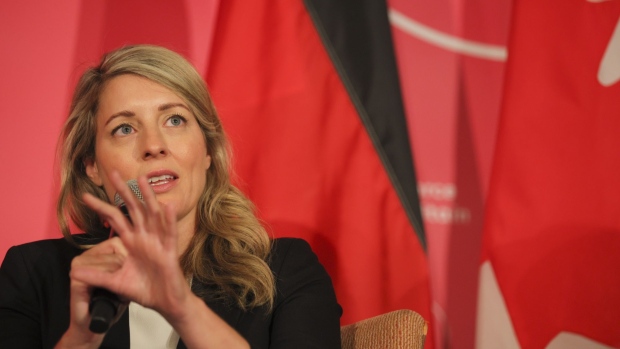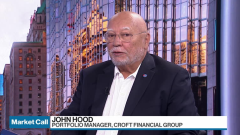Nov 9, 2022
Trudeau Envoy to Label China an ‘Increasingly Disruptive’ Force
, Bloomberg News

(Bloomberg) -- Prime Minister Justin Trudeau’s top diplomat called China an “increasingly disruptive global power” and warned that Canadians need to be “clear-eyed” about conducting business with the Asian giant.
The toughly worded remarks from Foreign Minister Melanie Joly, made during a keynote speech Wednesday in Toronto, provide a preview of the government’s long-awaited Indo-Pacific strategy.
“If there is one thing that 2022 has shown, it is that the tectonic plates of the world’s power structures are moving,” Joly said according to the prepared text of her address to the Asia Pacific Foundation and the Munk School of Global Affairs and Public Policy.
Canada has recently taken steps to distance itself economically from Chinese influence.
Earlier this year, Trudeau’s government joined its closest intelligence allies in banning Huawei Technologies Co. from fifth-generation wireless networks. And last week, Canada ordered Chinese investors to divest from three lithium mining companies under tougher foreign investment rules around the nation’s critical minerals sector.
Joly and Trudeau are due to leave on a lengthy trip through Asia for the Group of 20 summit and other meetings at the end of this week.
The Indo-Pacific strategy -- which will be released within a month -- is meant to deepen Canada’s trading and security relationships with democracies and like-minded countries in the region. But Joly said it’s also meant to show Canada wants to “be at the table, step up our game, and increase our influence.”
She said the strategy must outline an approach to China, Canada’s second-biggest trading partner after the US.
China complained to Canada about Joly’s remarks, Foreign Ministry spokesman Zhao Lijian said Thursday at a regular press briefing in Beijing, adding that they “contradict facts, smack of ideological bias and openly interfere in China’s internal affairs.”
The Asian nation was committed to peaceful development, openness and win-win corporation, Zhao said.
The northern nation demonstrated international leadership in 1970 by establishing diplomatic relations with China, recognizing that the world “could not sustainably isolate one-fifth of humanity from its international institutions,” Joly said
But “the China of 1970 is not the China of today,” she said. “China is an increasingly disruptive global power. It seeks to shape the global environment into one that is more permissive for interests and values that increasingly depart from ours.”
The speech comes just over a year after Beijing and Ottawa resolved a major diplomatic crisis over Canada’s arrest of Meng Wanzhou, Huawei’s chief financial officer and eldest daughter of its billionaire founder, on a US extradition request.
Just days after Meng was taken into custody in December 2018, China detained two Canadians, Michael Kovrig and Michael Spavor on national security charges. It freed them nearly three years later after the US struck a deferred prosecution agreement to release Meng from Canadian custody.
In her speech, Joly pledged to call out human rights abuses by China against Uyghurs and other minorities in the Xinjiang region, to support free speech in Hong Kong, and to strengthen its relationship with Taiwan.
“We will continue to oppose unilateral actions that threaten the status quo in the Taiwan Strait,” she said. “We will deepen our economic ties with Taiwan.”
Canada must still cooperate with China on many issues, and particularly on climate change, Joly said, promising “frank, open and respectful dialogue.”
When it comes to Canadians doing business in China, Joly said her message to executives and investors is not to be naive.
“The decisions you take as business people are your own,” the foreign minister said. “As Canada’s top diplomat, my job is to tell you that there are geopolitical risks linked to doing business with the country.”
She said the Indo-Pacific strategy will include adding dedicated experts on China to key embassies across Asia in an attempt to better understand “how China thinks, operates and plans.” Canada will spend C$50 million ($37.1 million) on that effort, her office said.
The speech also includes a section calling for Canada to expand its trade relationship with India as the latter grows into the most populous country in the world.
“India is looking to expand its commercial relationships in the energy, food and technology industries -- all areas of Canadian strength,” Joly said.
--With assistance from Erik Hertzberg and Dan Murtaugh.
(Updates with comments from China’s Foreign Ministry.)
©2022 Bloomberg L.P.


